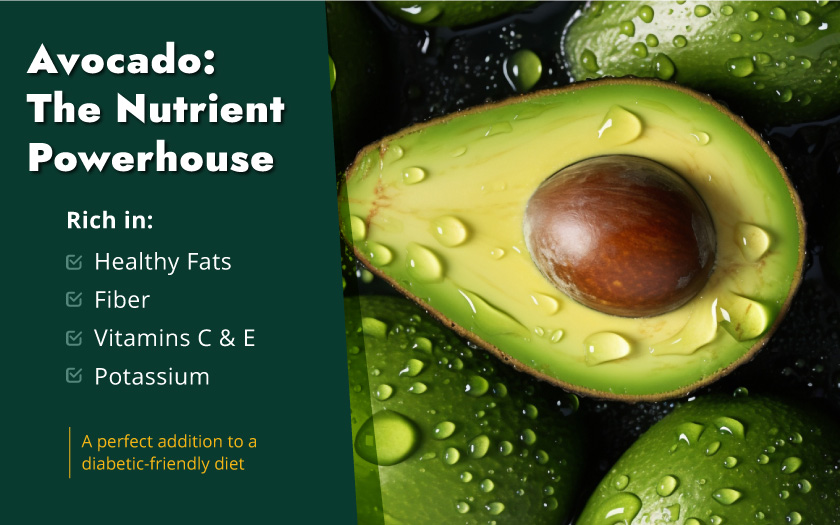
Introduction
Avocados has become a trending topic in the health community, especially among diabetics. Many are asking, “Is avocado good for diabetics?” This blog will explore whether they can be a beneficial addition to a diabetic diet.
What Makes Avocados Unique?
They are rich in healthy fats, fiber, and essential nutrients like potassium and vitamins E and C. These nutrients are crucial for overall health and can play a significant role in managing diabetes by promoting heart health and aiding digestion.
Avocados and Blood Sugar Levels
It have a minimal effect on blood sugar levels because of their low glycemic index. Unlike high-carb foods, avocados do not cause a rapid spike in blood sugar, making them a good choice for maintaining stable blood sugar levels.
Health Benefits of Avocados for Diabetics
Avocados offer several benefits:
- Healthy Fats: They are high in monounsaturated fats, which can improve cholesterol levels and reduce heart disease risk, common concerns for diabetics.
- Fiber Content: With about 7 grams of fiber per avocado, they help slow the absorption of sugars, keeping blood sugar levels in check.
- Antioxidants: These compounds help reduce inflammation, which can exacerbate diabetes complications.

Does Avocados Help Reduce Blood Sugar?
Studies show that eating avocados can help lower blood sugar levels. This is because it slow down the digestion of carbohydrates, leading to better blood sugar control. So, if you are wondering, “Does avocado help lower blood sugar?” the answer is yes.
Avocados Leaves and Diabetes: A Lesser-Known Benefit
Not many people know that avocado leaves can also be beneficial. This leaves have been used in traditional medicine to help control blood sugar levels. While more research is needed, many believe in their health benefits.
Is Avocados Safe for Diabetics?
Yes, avocado is safe for diabetics when eaten in moderation. It is important to watch the portion size. A recommended serving is about one-third of it. Including avocado in your diet can be a great way to enjoy a healthy, tasty meal without worrying about blood sugar spikes.

Delicious Avocado Recipes for Diabetics
Here are some simple avocado recipes for diabetics:
- Avocado Salad: Mix avocado with cucumber, tomato, and a pinch of salt for a refreshing salad.
- Avocado Toast: Spread mashed avocado on whole-grain toast and top with a sprinkle of sesame seeds.
- Avocado Smoothie: Blend avocado with spinach, almond milk, and a dash of cinnamon for a healthy smoothie.
Tips for Including Avocado in a Diabetic-Friendly Diet
- Buying Tips: Look for avocados that are firm but yield slightly when pressed.
- Storing Tips: Store ripe avocados in the refrigerator to keep them fresh.
- Usage Tips: Add avocado to salads, sandwiches, or enjoy it as a dip with veggies.
How Avocado Supports Heart Health in Diabetics
Heart health is a major concern for diabetics, as they are at a higher risk of cardiovascular disease. Avocados are heart-friendly due to their high content of monounsaturated fats, which help reduce bad cholesterol (LDL) and increase good cholesterol (HDL). This balance can lower the risk of heart disease, which is crucial for people managing diabetes.

The Role of Avocado in Weight Management for Diabetics
Maintaining a healthy weight is essential for diabetes management, and avocados can help. Their fiber content promotes satiety, which can prevent overeating and support weight loss efforts. By helping you feel full longer, avocados can reduce the need for frequent snacking, aiding in better blood sugar control.
Avocado’s Anti-Inflammatory Properties and Diabetes
Chronic inflammation is a common issue for diabetics and can lead to various complications. Avocados contain antioxidants like vitamin E and C, which help fight inflammation. Reducing inflammation can improve insulin sensitivity and overall diabetes management.
Understanding Portion Control with Avocado
While avocados are healthy, it’s important to consume them in moderation due to their calorie density. For diabetics, a recommended portion size is about one-third to one-half of an avocado per serving. This allows you to enjoy the benefits without consuming too many calories.
Myths and Facts About Avocado and Diabetes
There are several myths about avocados and diabetes. Let’s debunk a few:
- Myth: Avocados are too fatty for diabetics.
- Fact: The fats in avocados are healthy and help improve heart health.
- Myth: Avocados raise blood sugar levels.
- Fact: Avocados have a low glycemic index and do not cause blood sugar spikes.

Incorporating Avocado into Traditional Indian Meals
Avocado can be easily added to traditional Indian meals:
- Avocado Paratha: Mix mashed avocado into whole wheat dough for a nutritious twist on paratha.
- Avocado Raita: Blend avocado with yogurt, cumin, and coriander for a creamy, diabetes-friendly raita.
- Avocado Rice: Add diced avocado to steamed rice with a dash of lemon juice and black pepper.
Avocado Oil: Another Healthy Option
It has a high smoke point, making it ideal for cooking, and contains the same healthy fats found in the fruit. Using avocado oil in cooking can help maintain heart health and improve blood sugar control.

Combining Avocado with Other Diabetes-Friendly Foods
Pairing avocados with other diabetes-friendly foods can enhance their benefits:
- Avocado and Eggs: A perfect combination for a protein-packed, low-carb breakfast.
- Avocado and Nuts: A healthy snack that provides fiber, protein, and healthy fats.
- Avocado and Legumes: Adding avocado to a bean salad can improve the overall nutritional value and aid in better blood sugar control.
When to Avoid Avocado in a Diabetic Diet
While avocados are generally safe for diabetics, there are a few situations where they might need to be avoided or consumed with caution:
- Allergies: Some individuals may have an avocado allergy and should avoid it.
- High-Calorie Diets: For those on a strict calorie-controlled diet, it’s essential to monitor avocado intake to avoid excess calorie consumption.
Frequently Asked Questions about Avocado and Diabetes
Is avocado safe for diabetics?
Yes, avocados are safe for diabetics. They have a low glycemic index and are rich in healthy fats and fiber, which help regulate blood sugar levels.
Does avocado raise blood sugar levels?
No, avocados do not raise blood sugar levels significantly. Their low carbohydrate content and high fiber help maintain stable blood sugar.
Can eating avocado help lower blood sugar?
Yes, avocados can help lower blood sugar levels. Their fiber content slows down digestion and sugar absorption, preventing blood sugar spikes.
How much avocado can a diabetic eat in a day?
Diabetics can safely eat about one-third to one-half of an avocado per day, depending on their overall calorie and fat intake.
Are there any risks of eating avocado for diabetics?
Avocados are generally safe for diabetics, but excessive consumption can lead to weight gain due to their high-calorie content. Moderation is key.
Can avocado leaves be used for diabetes management?
Avocado leaves are used in traditional remedies for diabetes management due to their potential to regulate blood sugar, but more scientific research is needed to confirm their efficacy.
How can I incorporate avocado into my diabetic diet?
You can include avocados in salads, spreads, smoothies, or as a topping for toast. They can also be used in Indian dishes like parathas or raita for a nutritious twist.
Is avocado oil a good alternative for diabetics?
Yes, avocado oil is a healthy option for diabetics. It contains healthy fats and has a high smoke point, making it suitable for cooking.
Can avocados help with weight management in diabetics?
Yes, the fiber in avocados promotes satiety, helping with weight management, which is crucial for controlling diabetes.
Are there any myths about avocados and diabetes?
A common myth is that avocados are too fatty for diabetics. In reality, the monounsaturated fats in avocados are healthy and beneficial for heart health and blood sugar control.
Conclusion
Avocado is a nutrient-rich fruit that offers numerous health benefits for diabetics. It helps in managing blood sugar levels, supports heart health, aids in weight management, and has anti-inflammatory properties. By incorporating avocado into a balanced diet, diabetics can enjoy its delicious taste and health benefits.
By understanding the benefits and how to incorporate avocados into your meals, you can take a step towards better diabetes management. Enjoy avocados as part of a healthy, balanced diet to help control blood sugar levels and improve overall health.
